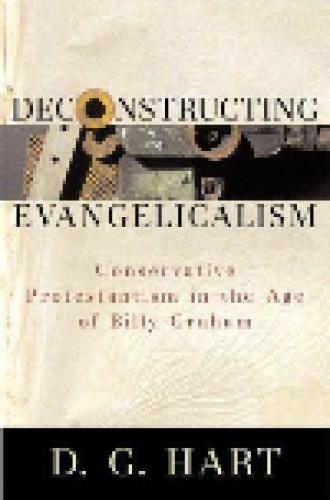Deconstructing Evangelicalism
In this cogent critique of modern evangelicalism, D. G. Hart of Westminster Theological Seminary paints a bleak picture of a movement that he believes is increasingly lacking in theological depth and substance. While admiring the enthusiasm and dynamism of many evangelicals, he laments the fact that evangelicalism itself lacks a solid theological core and therefore is unable to avoid fractures and schism. He also decries the movement’s accommodation to the consumerist mentality of the present cultural ethos—manifested, for example, in giving priority to church growth over purity in doctrine. In this connection he warns against a growing secularism in Christian music and worship.
Hart’s recommendation is that the term evangelicalism be abandoned as a description of a “separate religious entity” because it woefully lacks theological specificity. It is wrapped in an ambiguity that discourages profound reflection and theological probing. He sees hope in a return to a sacramental understanding of worship and a renewed appreciation for the fathers and doctors of the church universal.
The better way, in my opinion, is to redefine the term evangelicalism rather than jettison it. The term is admittedly contestable, but it could still be useful to the church if it were more closely related to the Protestant Reformation, which is its basis in history. As I see it, evangelicalism is that movement of revival and reform in Christian history that springs from the gospel itself and seeks to renew the church in the light of the gospel. In historical evangelicalism the Bible is set over tradition; grace is set over merit; faith is set over experience. At the same time, faith does not nullify human experience but bears fruit in it. There is no inherent conflict between structure and ecstasy, as Hart suggests. Prior to both is God’s self-revelation in Jesus Christ.
Ideally a theology of the Word should be united with a theology of Word and Spirit, and there are ventures in this direction. Karl Barth’s contribution is the most notable in recent years, but Barth is nowhere mentioned by Hart. Nor are other theologians who are strongly biblical and who do not hesitate to identify themselves as evangelical (P. T. Forsyth, Alister McGrath, Timothy George, J. I. Packer and myself, for example).
Hart is especially critical of pietism, which he accuses of reducing faith to religious experience. Yet he does not see that formalism and ceremonialism can be as grave a threat to faith as pietism. Arid repetition of set formulas can obviate the need for personal commitment to the Lord Jesus Christ. Nor does he recognize that one can have a high view of the church and be low church in the sense of endorsing liturgical minimalism.
I agree with Hart that we must not confound evangelicalism as a movement of renewal with a conservative political ideology—a temptation today. Rather, those of us who stand in this tradition can celebrate evangelicalism as a movement that keeps us in touch with our Reformation and pietistic roots. We should bear in mind that there is an ambiguity in many other labels used in theology—including Reformed, orthodox, catholic, ecumenical and fundamentalist. All of these are subject to dispute, but this is what theology is for—the purification of our language through renewed submission to Jesus Christ and to the message about him as delineated in holy scripture and attested to in sacred tradition.




